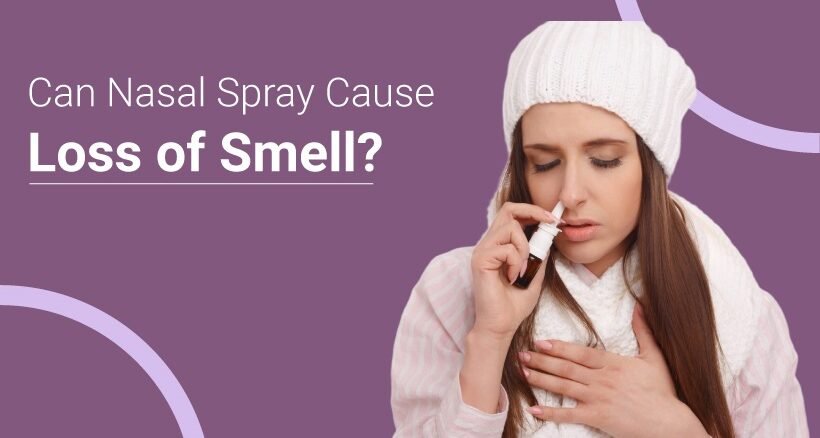Nasal sprays are a common remedy for congestion, allergies, and sinus issues. While they provide much-needed relief, there are concerns about their potential side effects, including loss of smell. In this blog, we will explore whether nasal sprays can indeed cause loss of smell, the types of nasal sprays available, and how to use nasal sprays safely to minimize risks.
Can Nasal Spray Cause Loss of Smell?
Yes, in certain cases, nasal sprays can cause a temporary or permanent loss of smell. This side effect is often associated with overuse or misuse of nasal sprays, particularly those containing decongestants or steroids. Prolonged use can damage the nasal lining, leading to inflammation and affecting your sense of smell.
Key points to remember:
- Over-the-counter decongestant sprays, when used excessively, can lead to a condition called rhinitis medicamentosa, causing nasal irritation and smell loss.
- Some prescription nasal sprays with corticosteroids can affect the nasal mucosa when not used as directed.
- Rare cases of anosmia (loss of smell) have been linked to specific nasal sprays contaminated with harmful ingredients.
Types of Nasal Sprays
Understanding the different types of nasal sprays can help you choose the right one and use it effectively. Here are the most common varieties:
- Decongestant Nasal Sprays
- Provide quick relief by shrinking swollen blood vessels in the nasal passages.
- Examples: Oxymetazoline, Phenylephrine.
- Recommended use: No more than 3 days to avoid rebound congestion.
- Steroid Nasal Sprays
- Reduce inflammation caused by allergies or chronic sinusitis.
- Examples: Fluticasone, Budesonide.
- Safe for long-term use under medical supervision.
- Saline Nasal Sprays
- Contain saltwater to moisturize dry nasal passages and clear mucus.
- Safe for daily use with no significant side effects.
- Antihistamine Nasal Sprays
- Target allergy symptoms by blocking histamines.
- Examples: Azelastine, Olopatadine.
- Combination Nasal Sprays
- Combine two medications, such as antihistamines and steroids, for dual action.
How Can Nasal Sprays Cause Smell Loss?
Nasal sprays can contribute to smell loss through the following mechanisms:
- Damage to Nasal Lining: Prolonged use of decongestants can irritate and inflame the nasal lining, impairing olfactory receptors.
- Blockage of Olfactory Nerves: Inflammation caused by overuse of sprays can obstruct the nerves responsible for detecting smells.
- Toxic Ingredients: Certain sprays may contain harmful substances that directly affect the olfactory system.
- Underlying Conditions: Misuse of nasal sprays may exacerbate existing nasal or sinus conditions, indirectly leading to smell loss.
Signs of Smell Loss
Recognizing the early signs of smell loss is essential for timely intervention. Symptoms include:
- Reduced ability to detect familiar odors.
- Difficulty distinguishing between different smells.
- Complete inability to smell (anosmia).
- Altered sense of smell (e.g., perceiving odors differently).
If you notice any of these signs, consult a healthcare professional immediately.
How to Use Nasal Sprays Safely
Proper usage of nasal sprays is crucial to prevent complications like smell loss. Follow these steps for safe application:
- Read the Label: Understand the recommended dosage and frequency.
- Blow Your Nose: Clear your nasal passages before using the spray.
- Shake the Bottle: Ensure even distribution of the medication.
- Tilt Your Head Slightly Forward: Keep the nozzle upright and gently insert it into one nostril.
- Spray and Inhale: Press the pump while breathing in gently through your nose. Repeat for the other nostril if needed.
- Avoid Sharing Sprays: Sharing can spread infections.
- Limit Use: Follow the prescribed duration, especially for decongestants.
Can Loss of Smell Be Fixed?
The ability to regain your sense of smell depends on the underlying cause. Here are some approaches:
- Discontinue Overuse: Stop using decongestant sprays if you suspect rebound congestion.
- Medical Treatment: Consult an ENT specialist in Ahmedabad for prescription medications or therapies.
- Olfactory Training: Repeatedly smelling specific scents can help retrain the olfactory system.
- Address Underlying Conditions: Treat sinus infections, allergies, or other contributing factors.
- Surgical Intervention: In rare cases, surgery may be necessary to correct structural issues in the nasal passages.
Conclusion
Nasal sprays are a convenient solution for managing nasal congestion and allergies, but improper use can lead to side effects, including loss of smell. By understanding the types of nasal sprays and using them correctly, you can enjoy their benefits while minimizing risks. If you experience any signs of smell loss, seek professional guidance promptly.
For expert advice and personalized care, consider consulting Dr Simple Bhadania. With extensive experience in ENT care, Dr. Simple Bhadania specializes in diagnosing and treating conditions affecting the nose and sinuses. Book an appointment today to safeguard your nasal health and overall well-being.


